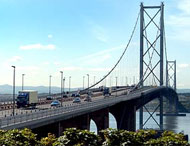2/11/2008
Scotland Abolishes TollsScotland eliminated the last remaining toll bridges in the country to reduce congestion and air pollution.

Beginning today, motorists in Scotland will no longer be forced to pay extra fees to use roads anywhere in the country. The last remaining toll booths, located on the Forth and Tay bridges, shut down at midnight after legislation abolishing tolls took effect. The move was made in the name of improving commerce while reducing congestion and air pollution.
"This will not only be a boost for Fife, it will also enable Scotland as a toll free nation to attract more inward investment and tourists," the National Alliance Against Tolls said in a statement. "Our tolls battle has been against politicians and their officials who seemed to be determined to keep the tolls no matter what the logic or justice of tolls removal, and how little money they netted from the tolls."
Groups in Scotland battling the tolls since 1995 won their first victory with abolition of tolls on Skye Bridge in 2004. A Scottish government review had found little net benefit to the public when the effect of tolling on the road network as a whole was considered.
"Changes to tolls can affect travel patterns e.g. by encouraging new, additional or longer journeys; and this in turn affects both congestion levels and emissions of greenhouse gases and air pollutants that affect local air quality," the Tolled Bridges Review Phase One Report concluded (view report in 688k PDF format). "Motorists making journeys on congested roads cause delays both to themselves and to other vehicles on that road and the surrounding network. The costs are borne, both by the individual motorist, and by other road users, in the form of increased journey times, safety problems, and pollution. Longer journeys with unpredictable delays add to the cost of industry and commerce. As such, congestion is a significant cost to the economy."
Scottish economist Adam Smith came to a similar conclusion in 1776. In his seminal treatise on the Wealth of Nations, Smith found that the use of tolls to raise government revenue inevitably leads to a loss of commerce.
"But the turnpike tolls being continually augmented in this manner, instead of facilitating the inland commerce of the country as at present, would soon become a very great encumbrance upon it," Smith wrote. "The expense of transporting all heavy goods from one part of the country to another would soon be so much increased, the market for all such goods, consequently, would soon be so much narrowed, that their production would be in a great measure discouraged, and the most important branches of the domestic industry of the country annihilated altogether."
It took a century for Smith's ideas to take hold with an 1883 act of parliament banning most tolls in Scotland. The levies recently returned on four bridges -- the Forth in 1964, the Tay in 1966, Erskine over the Clyde in 1971 and the Skye in 1995. An attempt to impose a London-style congestion tax in the Scottish capital failed completely in 2005 when Edinburgh residents voted three to one against the proposal in a referendum.
Article Excerpt:Scottish Statutory Instruments
2008 No. 22 (C. 3)
TRANSPORT
ROADS AND BRIDGES
The Abolition of Bridge Tolls (Scotland) Act 2008 (Commencement) Order 2008
Made 30th January 2008
The Scottish Ministers make the following Order in exercise of the powers conferred by section 4(2) of the Abolition of Bridge Tolls (Scotland) Act 2008(1).
Citation
1. This Order may be cited as the Abolition of Bridge Tolls (Scotland) Act 2008 (Commencement) Order 2008.
Appointed day
2. The provisions of the Abolition of Bridge Tolls (Scotland) Act 2008, in so far as they are not already in force, come into force on 11th February 2008.
STEWART STEVENSON
Authorised to sign by the Scottish Ministers
St Andrew's House,
Edinburgh
30th January 2008
Explanatory Note
(This note is not part of the Order)
This Order appoints 11th February 2008 as the day on which the Abolition of Bridge Tolls (Scotland) Act 2008, except section 4, will come into force. Section 4 relates to commencement and short title and came into force on Royal Assent, which was granted on 24th January 2008.


